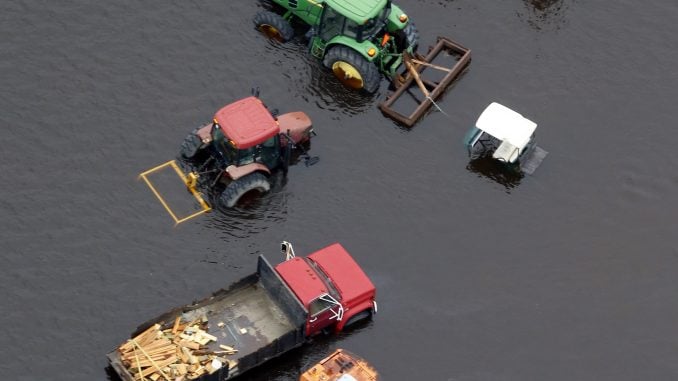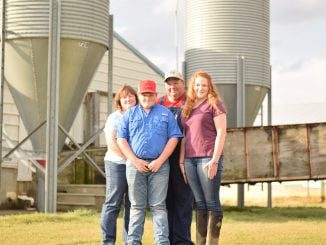
RALEIGH, N.C. — The damage to North Carolina’s agriculture industry from Hurricane Florence could reach well into the billions of dollars.
“I think it’s easily going to be in the billions of dollars,” N.C. Agriculture Commissioner Steve Troxler said, calling the damage “catastrophic” and “unbelievable.”
Florence came as the second swing in a one-two punch, the first being Hurricane Matthew in 2016. However, this time it’s worse. Matthew hit in October, when most of the crops had already been harvested. This time, losses to tobacco, cotton and corn crops are sure, and farmers are watching sweet potatoes and peanuts carefully to see if the floodwaters jeopardized their below-surface survival.
“This hurricane couldn’t have come at a worse time,” North Carolina Farm Bureau President Larry Wooten said.
North Carolina damage estimates are expected to come in next week, but it isn’t looking good so far from the limited view they have. Standing water still blocks roads into farming areas of central and eastern North Carolina where five of the state’s top six farming counties are within the hardest-hit areas.
In tobacco alone, Graham Boyd, chief executive of the Tobacco Growers Association of North Carolina, estimates losses could total as much as 125 million pounds, valued at $250 million to $350 million, primarily because about 40 percent of the tobacco crop remained in the field when Florence came ashore.
Beyond crops, livestock losses in North Carolina are estimated at 3.4 million poultry and 5,500 hogs so far, the state Agriculture Department said. The department is working with farmers as crops exposed to floodwaters are not fit for human consumption, and they must be tested to be used for animal food.
“Floodwater may contain sewage, harmful organisms, pesticides, chemical wastes or other substances,” said Troxler. “Also, wet foods may grow mold, which can produce toxins that can harm humans and animals.”
But livestock and other food are not the only victims. Kim Kornegay’s family farm in Johnston County could lose 40 percent of its cotton crop, farm manager T.J. Sasser said Thursday. Workers there prepared to slog through the mud last week to try to see what sweet potatoes could be salvaged.
“We’re optimistic, but we’re also realistic,” Kornegay said.
In the meantime, business owners and residents in hard-hit areas of N.C. could stop by “insurance camps” set up in Craven and Onslow counties this week. The North Carolina Department of Insurance brought together representatives from about 20 different insurance companies, plus the Federal Emergency Management Agency, charities and other organizations to set up on-stop shop locations in the parking lot of a Lowe’s in New Bern and Lowe’s in Jacksonville.
“I’m guessing there is close to 10,000 insurance adjusters on the ground here in N.C. and more on the way,” said N.C. Insurance Commissioner Mike Causey in an interview on WPTF radio in Raleigh. “The magnitude of this thing is just staggering. I’ve heard people in some of these counties say this is 50 times worse than Floyd in their area.”
While more counties are under review, so far 27 North Carolina counties have been approved for federal disaster aid which, in addition to state help, will be the lifeline for most people impacted. Out of the state’s population of 10.5 million people Causey estimated that North Carolina has about 135,000 policies in the federal flood insurance program.
“The majority of people don’t have it and don’t have it unless they’re forced to have it. Even in a coastal town less than 10 percent of people have flood insurance,” he said.
“Most people are just shocked to learn that floods are not covered by a homeowner’s insurance,” he added.
This week, North Carolina’s congressional delegation secured $1.14 billion for disaster aid in the Federal Aviation Administration reauthorization bill as a “down payment” on the big recovery bills to come. Troxler and Cooper met with U.S. Agriculture Secretary Sonny Perdue on Monday at RDU airport, because weather and flooding prevented the secretary from viewing damage firsthand.
“You get very depressed looking at it, you know how much despair that is down there and its going to be a long recovery – but when I get to feeling really bad about it, I think about all the faith-based groups that have come in to feed people, to rescue people, the Baptist men have been absolutely amazing,” said Troxler Monday at meeting with farmers in Kenansville.
“Help your neighbor. That’s the main thing we’ve got to do it we’ve always done it and it will get us through – but it’s not going to be quick, there’s no question about it.”
The Associated Press contributed to this report.


